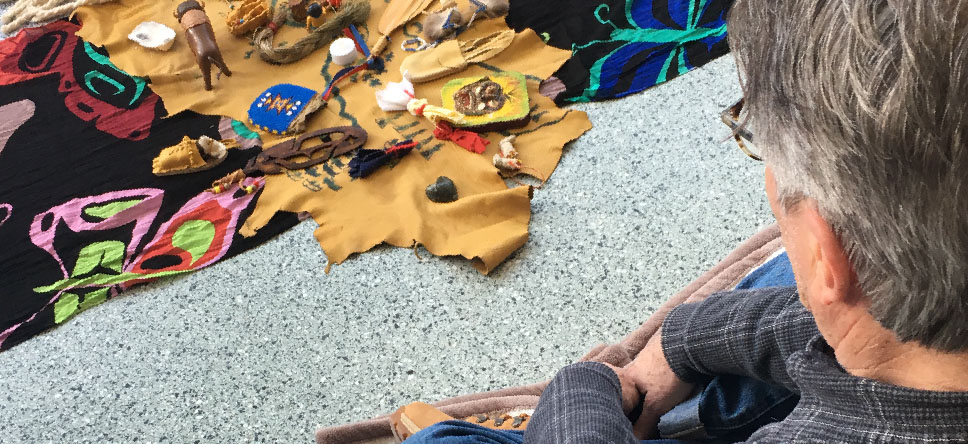
Blanket exercise builds bridges, Indigenous knowledge
With a howling wind outside Buhler Atrium, a group of nearly 50 faculty and staff from Rady Faculty of Health Sciences gathered in a circle and prepared for a glimpse back in time to pre-contact Canada.
Facilitator Kathi Camilleri set the scene for the half-day workshop, “Building Bridges Through Understanding the Village”, by laying out a blanket and adding objects symbolizing Indigenous life in pre-contact Canada.
 She set out a feather to signify governance, then a cradleboard for children. A canoe stood for travel, while a drum was a reminder of music and song. Many more objects – each with a specific tie to Indigenous life in Canada before the arrival of Europeans – helped tell a story about a traditional way of life.
She set out a feather to signify governance, then a cradleboard for children. A canoe stood for travel, while a drum was a reminder of music and song. Many more objects – each with a specific tie to Indigenous life in Canada before the arrival of Europeans – helped tell a story about a traditional way of life.
The group took on roles within the village, and then Camilleri put on a red hat and the identity of colonizer. One by one, she took away the objects from the blanket. Language. Bison. Ceremony. Nearly everything the community held sacred.
Then she started taking the children.
“As I was playing the role of a parent, I had a deep sense of hopelessness, injustice and fear that I may never hold my child again,” said Sarah Olson, one of the organizers and a descendent of residential school survivors. “I was made aware of the jarring reality of how my great-grandmother and grandmother might have felt having their children taken.”
Camilleri, who comes from both Indigenous and Irish heritage, had warned the group that the day wouldn’t be easy. Colonization is an issue that raises complex feelings for Indigenous people and newcomers alike. But as simple as it would be to make the story about “good and bad,” she encouraged participants to set aside any feelings of blame or shame that might come up. “This is about people who saw a great opportunity to come to this country and improve their own situation, as well.”
The powerful half-day event was hosted by the College of Pharmacy as part of an effort to weave greater cultural sensitivity into its curriculum, while opening up opportunities for other members of the Rady Faculty.

Dana Turcotte (left) and Sarah Olson (right), event co-organizers.
“The name of the workshop, Building Bridges, perfectly sums up what I was hoping to do by co-leading this project,” said Olson, who works for the Office of the Provost and Vice-President (Academic) as project assistant, Indigenous engagement. “I wanted our attendees to understand how essential it is to truly listen to one another to make sure we are fulfilling the Truth and Reconciliation Commission’s calls to action and the U of M’s strategic priority of Indigenous achievement in a respectful, inclusive way.”
Co-organizer Dr. Dana Turcotte, clinical assistant professor in the College of Pharmacy, Rady Faculty of Health Sciences, is hopeful that the event will serve as fuel to spark participation within the College of Pharmacy in the upcoming aspects of the Purposeful Pause Project, a new initiative to assess Indigenous knowledge within the college and build a stronger foundation for ongoing work in inclusive education.
“Although this workshop was intended to be a celebration of work done to date, it really was more of an opportunity for us to purposefully pause, reflect, and continue to move forward,” said Turcotte.
The college has now completed baseline Indigenous knowledge assessments of its undergraduate students and will begin the same process with faculty and staff. “As well, we will be holding several focus group sessions where we will seek to identify factors within our current curriculum and program that may be prohibitive to fostering an academic culture of Indigenous respect and achievement,” said Turcotte.
“Ultimately, our goal is to ensure our students leave our university with an informed, compassionate approach in their fields,” added Olson. “I think initiatives such as ours are helping to ensure not only that students are prepared, but their teachers and mentors are committed to this change as well.”






